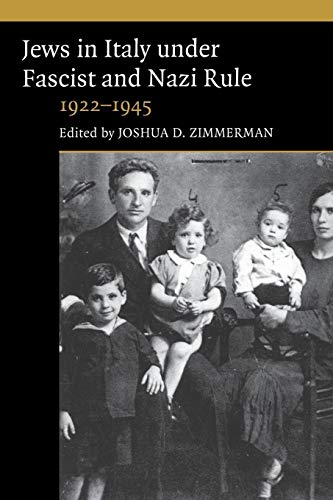
Jews in Italy under Fascist and Nazi Rule, 1922-1945
by Joshua D. Zimmerman
Popularity
0.24 / 5
* A book's popularity is determined by how it compares to all other books on this website.
Where to buy?
Buy from Amazon* If you buy this book through the link above, we may receive a small commission at no extra cost to you.
Jews in Italy under Fascist and Nazi Rule, 1922-1945 by Joshua D. Zimmerman
Details
War:
World War II
Perspective:
Civilian
True Story:
Yes
Biography:
No
Region:
Europe
Page Count:
396
Published Date:
2009
ISBN13:
9780521145947
Description
Brief Summary
Jews in Italy under Fascist and Nazi Rule, 1922-1945, edited by Joshua D. Zimmerman, is a comprehensive examination of the experiences faced by Italian Jews from Mussolini's rise to power through the end of World War II. The book challenges the commonly held perception of Italian benevolence during the Fascist era by delving into the complex and often troubling dynamics between the Italian state, society, and the Jewish community. It sheds light on the multifaceted aspects of Italian Jewry's treatment under both Mussolini's regime and the subsequent Nazi occupation.
Main Themes and Topics
This volume is divided into a series of essays, each addressing different dimensions of the Italian Jewish experience under fascist and Nazi influence. A prominent theme is the role played by the Italian state and society in the persecution of Jews. The book delves into Mussolini's evolving policies that eventually culminated in the 1938 Italian racial laws targeting Jews and other minorities. The collection also examines the role of the Catholic Church, paying particular attention to the actions and inactions of Pope Pius XII during this tumultuous period.
Another significant theme is the exploration of native and foreign influences on Italian anti-Semitism, challenging the narrative that fascism's racial policies were merely a product of Hitler's influence. The essays analyze the prejudices propagated by the media, particularly through outlets like La Difesa della Razza, which played a critical role in shaping public opinion against Jews.
Writing Style and Tone
The book is scholarly in nature, bringing together contributions from various experts in the field of Holocaust and Italian studies. Each essay is meticulously researched, offering detailed analysis supported by historical evidence. The tone is academic yet accessible, making it suitable for both scholars and general readers interested in understanding this complex chapter of history.
Criticism
While the book is praised for its thorough research and the diversity of perspectives it offers, some readers may find the structure a bit fragmented due to the compilation of essays by different authors. This format can sometimes lead to overlapping topics or varying interpretations, which might challenge readers seeking a cohesive narrative.









